September 2016
On September 23rd, the Official Presentation of the X Edition was conducted in the Assembly Hall of the Scientific Centre of the University of Granada with the participation of mobility students of the IX Edition and new students of the X Edition of GEMMA. The panel was chaired by the Director of the University’s Institute of Women’s and Gender Studies, Ana María Muñoz Muñoz, the GEMMA Consortium Coordinator, Adelina Sánchez Espinosa, and the GEMMA Academic Coordinator for the University of Granada, Gerardo Rodríguez Salas. The invited scholar for the opening conference was Luisa Campuzano Sentí, from Casa de las Américas of Cuba. Her lecture was about women travelers of the XIX Century from US-Cuba and Cuba-US.

Welcome Session
On September 23rd, a session was held in order to welcome GEMMA students, scholars and the coordination staff. The primary objective of the meeting was to present the courses and inform students about the different activities scheduled for the 2016-2017 academic year. The student body had the opportunity to meet the professors, as well as, the coordination staff sharing experiences and exchanging first impressions.
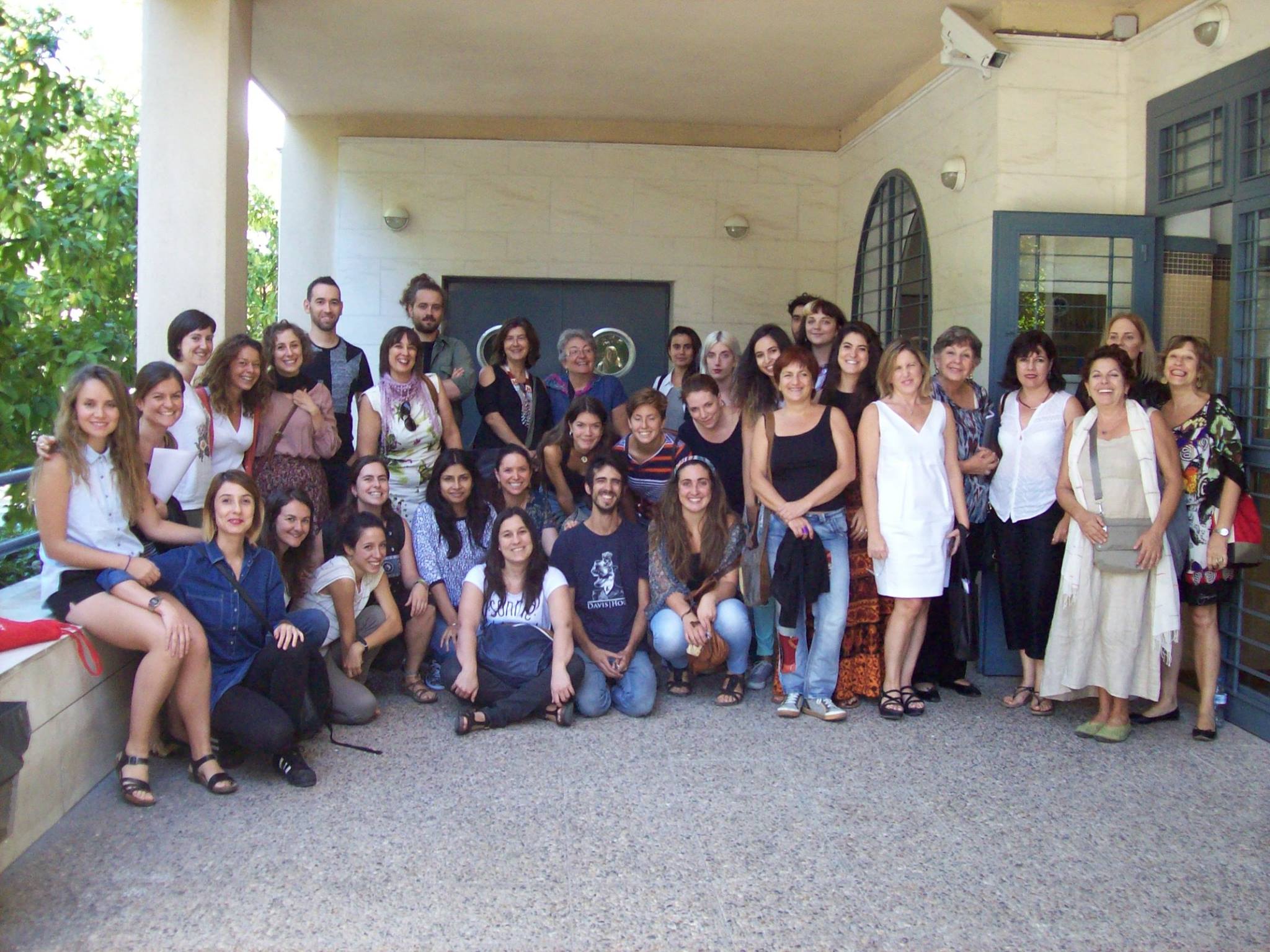
Clothesline Project
On September 30th, we were visited by the Dickinson College Scholar, Susan Rose, who imparted the workshop: “Global Clothesline Project: Bearing Witness to Violence Against women”. The main objective was to analyze violence against women through the creation of shirts, inferred to the experience of gender violence and how it can be overcome. Students from the IX and X Edition of GEMMA participated in the workshop.

Visiting Scholar
Susan Rose is a Sociology Professor and the Director of Community Studies Centre of the Dickinson College in the United States. She specializes in sociology of religion, family and education; violence, indigenous studies; and inequality, class, race and gender studies. She has conducted academic fieldwork in the United States, Guatemala, the Philippines and South Korea, in relation with evangelist movements, education and gender, resulting in a number of book and article publications.
Luisa Campuzano Sentí has a Bachelor’s Degree in Classical Literature and a Doctorate in Philology. She was a Professor in the Literature and Arts Department, as well as, a member of its Scientific Council of the University of La Habana from 1977 until her retirement in 2000. She has founded the Women’s Studies Program of La Casa de Las Américas which she chairs since 1994. In the same place, she was in charge of the Literature Research Centre. She coordinated the Casa de las Américas´ Literature Award from 1987 until 1994. In 1998, she became the Director of the Journal Revolución y Cultura and since 2008, she is part of the Directive Board of the Alejo Carpentier Foundation.
Professor Iara Beleli has a Bachelor Degree in History from the Campinas State University of Brazil (1983), Master in History from the Catholic University of Sao Paulo, Brazil (1999), and she attained her Doctorate in Social Sciences from the Campinas State University in 2005. She completed her Post-Doctorate Degree in 2008 from ISCTE-Lisboa. Since 2012, she is a Post-Doctoral student in the University Rovirai Virgili of Tarragona in Spain. She is, currently, working as a researcher and coordinates the Gender Studies Centre of PAGU/Unicamp. Her main researches are on the means of communications, especially the Internet, and its intersectionality with gender and other differences (such as race, sexuality and nationality), dialoguing with feminist theory and gender studies.
Professor Luisa Guardiola Tey has a Doctorate Degree from the University of Pennsylvania and a Bachelor Degree in Spanish Philology from the University of Barcelona. She specializes in Spanish Literature of the 19th and 20th Centuries. Luisa Guardiola is, currently, a Professor of the Swarthmore College in the United States.
October 2016
Visiting Scholars
Professor Rosa Cobo Bedía teaches Sociology of Gender in the University of La Coruña. She is the funder, as well as, the first Director of the University’s Interdisciplinary Seminar of Feminist Studies from 2000 to 2003. She has coordinated the Master on gender and equality policies from 2005 until 2008. The Professor’s main research focuses are on feminist theory and gender sociology. One of her latest and most remarkable publication is the book Hacia una nueva política sexual. Las mujeres ante la reacción patriarcal (2011), in which she analyzes the new processes that feed the current patriarchal reaction against women. She was an invited scholar, on the 5th and 6th of October, to the class Teoría feminista: igualdad, diferencia y diversidad (Feminist Theory: equality, difference and diversity), coordinated by Professor Cándida Martíntez
Lina Gálvez Muñoz was an invited scholar on October 17th and 18th in the class Teoría feminista: igualdad, diferencia y diversidad (Feminist Theory; equality, difference and diversity). She is a Professor of History and Economic Institutions in the Pablo Olavide University of Sevilla. She has a Doctorate Degree from the European University Institute in Florence. From 2007 until 2012, she was Vice Chancellor of the Post-Graduate and Permanent Education in the Pablo Olavide University of Sevilla. Since 2009, she is the Director of the University’s Master in Gender and Equality and since 2010, of the Doctorate Program in Development and Citizenship. The Professor publishes in several prestigious magazines and editorials.
Professor Montserrat Cabréi Pairet, from the University of Cantabria was the invited scholar of October 10th to the Género, cuerpo y mujeresen la historia de Occidente: prácticas de salud y discursos científicos (Gender, body and women in west History: Health practices and scientific discourses) class on October 10th, coordinated by Teresa Ortiz and Agata Ignaciuk. Montserrat Cabréi has a Doctorate in Medieval History from the University of Barcelona. She teaches History of Science in the University of Cantabria, in which she introduced and directed the Interdisciplinary Seminar Isabel Torres for Women's and Gender Studies between 2004 and 2010. Since the 1980’s, she is an activist of the movement for the institutionalization of women and gender studies, in which she cooperates with the National and International Professional Associations. She was the Secretary of the Spanish Association of the Research of the History of Women. She was awarded in 2011 with the 1st Equality Award given by the University of Cantabria
November 2016
Ana Fonseca was invited to lecture the Master GEMMA students on November 7th on Social Protection Systems in Latin America: Focused vs. Universal. Ana Fonseca has a Doctorate Degree in Family History and Gender Relations from the University of Sao Paulo in Brazil. She is, currently, a Researcher and Associate Coordinator of the Public Policies Study Centre of the University of Campinas. During Lula da Silva’s first mandate, she coordinated the Program Bolsa Familia and she was, also, Vice Minister of the Social Development and Fight Against Hunger Ministry. During Dilma Rousseff’s first presidency, she was the Extraordinary Secretary of the Secretary for Overcoming Extreme Poverty in Brazil. Since she stopped working for the government, she has been a Consultant for the Regional Offices of the United Nations Development Programme and the Food and Agricultural Organization of the United Nations, where she analyses social policies and conditional transferring programs. Ana Fonseca has published a number of books, book chapters and articles in academic journals in Brazil and Latin America.
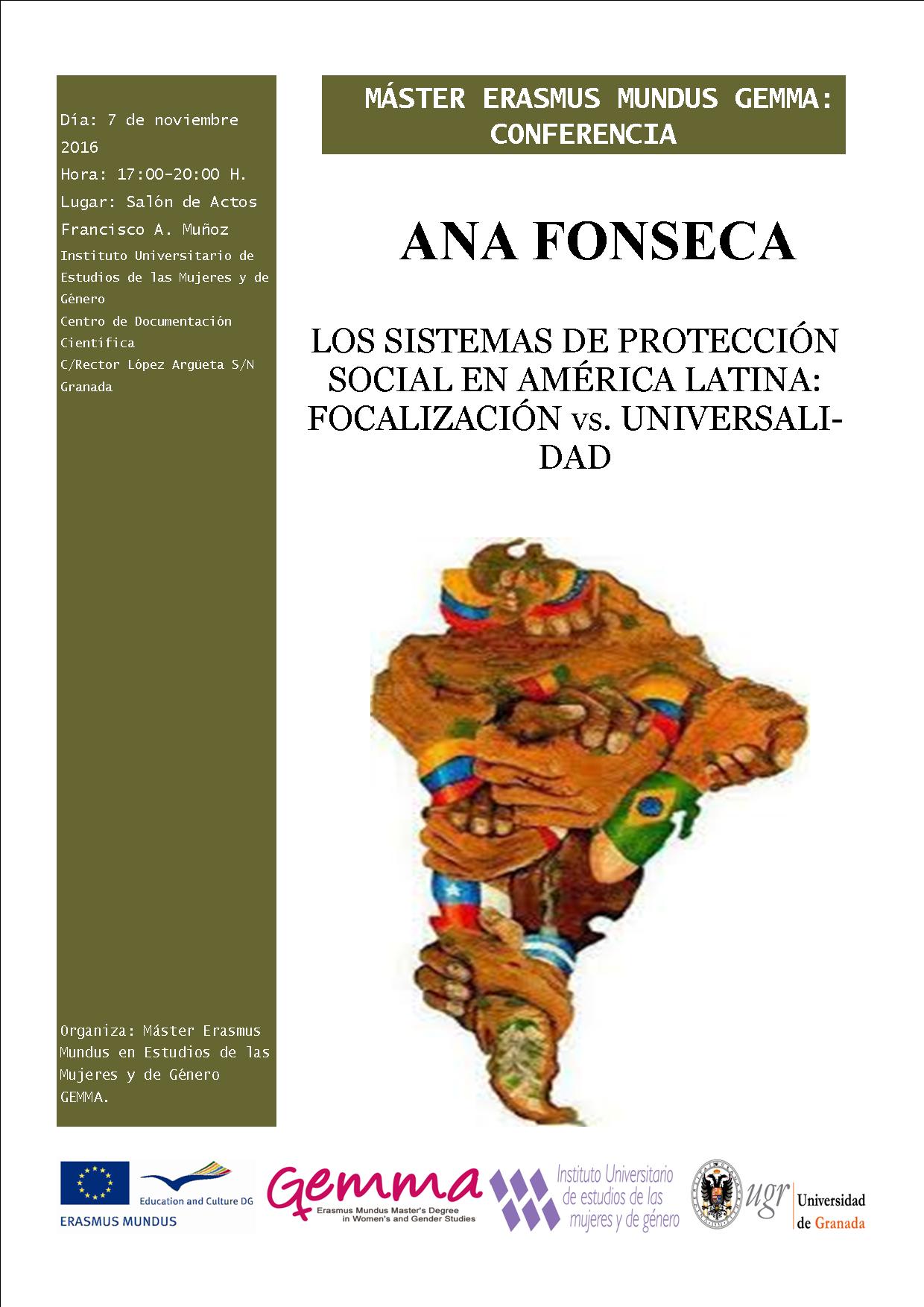
Marek Wojtaszek works as Assistant Professor in the Humanities Department, the American Studies Department and the Media Department of the Faculty of Political and International Studies of the Lodz University in Poland. Professor Wojtaszek was invited to lecture in the Master GEMMA on November 23rd and 24th 2016 in the Case Studies II and Gender, Art and Literature, classes coordinated by the Professor Adelina Sánchez Espinosa
Dorota Golańska, works as a professor of the American Studies Department, of the Media Department and Women Studies of the Lodz University in Poland. She was invited to lecture on the Master GEMMA on November 23rd and 24th for the courses Case Studies II and Gender, Art and Literature, coordinated by Adelina Sánchez Espinosa. Professor Golańska has a Doctoral Degree on Humanities and a Master in International Relations. She researches on gender, new materialisms, and memory and trauma studies. She has, recently, worked with concepts such as technology of visualization, critiques of representation, affective studies, dark tourism, and aesthetics through a feminist approach. She has published several papers on these fields. Lately, her work is inspired by the philosophy of Deleuze and Guattari, and focuses on affective memory aspects, aesthetic and the synesthetic of trauma.
December 2016
Katherine O’Donnell, professor of the Dublin University of Ireland was invited to teach on December 12th and 13th 2016, as part of the Case Studies II course.
January 2017
María Jesús López Sánchez-Vizcaíno, works as Professor in the Department of English and German Philology of the University of Cordoba since 2008. Her main research focus is on South African Literature in English, Post-colonial literature and British Modernism through the use of community and deconstruction theories. She emphasizes the relationship between literature and ethnicity. The Professor has written about several renamed writers, such as, J.M. Coetzee, Virginia Woolf, Samuel Beckett, Margaret Atwood, Zakes Mda and Phaswane Mpe. She has visited the universities of Nottingham and York in the United Kingdom, Duke University the United States, the University of New South Wales in Australia and Cape Town and Rhodes in South Africa.
Video Forum
On January 23rd the Video Forum, Eradication of violence against women through the action of organizations in Bolivia and Ecuador, took place in the Assembly Hall of the European Documentation Centre of the University of Granada. It was organized by the Centro de Iniciativas de Cooperación para el Desarrollo de la Universidad de Granada (CICODE) and the Erasmuns Mundus Master´s Degree in Women´s and Gender Studies (GEMMA). The presentation and the discussion were conducted by María Alconnchel, Director of the Non- governmental Organization, Paz y Desarrollo, which is part of the CICODE. Its main objective is to work with vulnerable communities in the poorer countries of the South, by strengthening their personal abilities and social structures, in order to improve their lives. They currently work in 11 countries of Asia and Latin America. In the 21 years of life, the NGO has developed 781 projects and 9 partnerships (4 year projects of International Cooperation) in 35 countries in Latin America, Africa and Asia. The video is called Voices against gender violence and was presented for the first time. The documentary was developed by the CICODE and co-financed by the AACID. To watch the video click the following link: Video
In the documentary presents several women, leaders of different women groups, who work in Ecuador. The documentary highlights the importance of creating gender agendas and politicizing them through participative proposals. The main purpose of the NGO is to empower women, in order to eradicate the violence they suffer on daily bases. Both Ecuador and Bolivia have high indexes of intra-family violence and many women are killed by their partners. In Ecuador, the NGO works in 4 provinces. In Bolivia, they are present in all Municipalities, where their work is mainly with women in politics, because there is a high prevalence of political violence. Women are attacked for working in the government, which caused the creation of the Public Violence law of 2012. María has highlighted the essential role that Councilor Women have in the political life; as they put in the agenda specific problematics and needs of women. For these reasons, it is very important for her to work with them. The debate focused on how the education and economic independence are fundamental to achieve women’s freedom. The workshops of the NGO, in which women inform and discuss their sexual and reproductive rights, are a way to empower them towards their autonomy and independence. The presenter highlighted the importance of working at the same time on masculinities with men in the communities. In order to eradicate the violence against women, a work is needed that centers not only on women, but also on men who participate in the communities as well.
Georgina Dopico Black is an Associate Professor in the Spanish and Portuguese Departmentand Director of the Humanities Department of the New York University. She attained her Doctorate on Spanish and Portuguese Studies on 1995 from Yale University, in 1990 her Master’s Degree from Yale and in 1986 her Bachelor Degree in Literature and History from Harvard University. Her research areas are Early-modern Spanish literatures and cultures; cultural history; the body/anatomy; biopolitics; human/animal studies; gender studies; translation studies; canon formation/libraries; nation/empire; transatlantic studies.Cervantes. Some of her books are; USA Cervantes: 39 Cervantistas en Estados Unidos. (Co-editor with Francisco Layna). Madrid: CSIC / Polifemo, 2009; Perfect Wives, Other Women: Adultery and Inquisition in Early Modern Spain. Durham: Duke University Press, 2001, Winner of the 2001 Katherine Singer Kovacs Prize; Suplemento al Tesoro de la Lengua Española Castellana de Sebastián de Covarrubias (with Jacques Lezra.) Madrid: Polifemo, 2001 and En un lugar de la Mancha: Homenaje a Manuel Durán. (Co-editor with Roberto González Echevarría.)Salamanca: Ediciones Almar, 1999. Professor Dopico was invited on January 25th and 26th as an invited scholar to lecture the first year GEMMA students as part of the Historiografía Feminista course.
February 2017
Elena Casado has a PhD in Sociology from the Universidad Complutense de Madrid with an extraordinary award (2002). Her research fields are Sociology and Theory of Comunication, Sociology of Gender Relations and Sociological Theory. She was an invited professor at GEMMA for the module Feminist Methodologies C: Social Sciences and Feminist Criticism. Etnographic methodology and design of social qualitative research projects, coordinated by professors Carmen Gregorio and Ana Alcázar.
Celia Prados has a Doctorate Degree from the University of Granada. She works for its project “the role of the Law Faculties of the Universities of Andalusia during the Political Transition period (1975-1981)”(El papel de las facultades de derecho de las universidades andaluzas, durante la etapa de la Transición Política (1975-1981)), financed by the Centre of Andalusian Studies. Her main research fields focus on the History of the University and Sephardim migration. She is researcher of the investigation group “Justice and Government in the History of Spanish and European Law” (SEJ463), collaborated in the project “Ethnic groups rights in Colombia: gender, family and land in the Popayán” (PCI – AECID A/024600/09), financed by AECID (may 2009-2010), in the International Workshop of University Research “Holocaust Literature” organized by the CuRe project, “Rewritten bodies: pain and violence in women writers and women’s literature” (P07-HUM-03096) and DiGEC “Discrimination, Genocide and Cultural extermination. Women’s Literature in the Holocaust” (HUM -062). She lectured the first year GEMMA students on January 24th and on February 7th as an invited scholar in Cases Studies 1 course, in which she offered a review of women in the History of Law. The class included a guided visit to the Archivo de la Real Chancillería de Granada.
-A one-day-visit to the Archive of Granada’s Royal Chancery-
On the 7th of February, some students were lucky enough to visit the historic archive of Granada’s Royal Chancery (Real Chancillería). The activity was part of Celia Prados’ classes within Study Cases I.
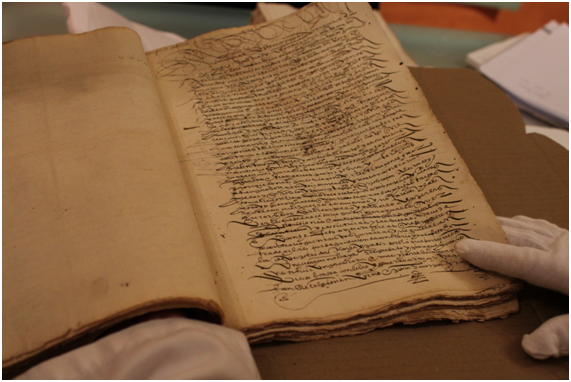
Located at a rebuilt building where Father Suárez was born (named as the square the building is at), the archive holds the administration records of the south of the Spanish kingdoms since 1537. The original Royal Chancery was located in Plaza Nueva, where the Superior Court of Justice of Andalucía is currently at. In the 19th century, it became Granada’s Provincial Courts. Granada was chosen to hold the Royal Chancery, as part of geopolitical strategies from the Catholic Monarchs’ heir in the 16th century. Granada’s Royal Chancery used to be the place where some significant issues from every region south of Tagus river were supposed to be resolved, whereas Valladolid’s Royal Chancery (and the Royal Audience) kept track of the northern regions. Eva is the archivist who taught and explained us the variety of documents the archive storage holds. She showed diverse examples: we were able to observe parchments from the 16th century. The multiple, even eccentric calligraphies demanded previous training in order to be read and de-codified. The documents were about southern law suits, and some of them lasted more than two centuries. As Eva reminded us, these documents serve as indispensable historical records for many research projects related to feminism and gender studies, such as the exchange of female slaves in the 17th century, the suits from abused women, the disputes for nobility recognition, and (one of the hardest to access to) people judged under the 1933 Law Against Vague and Criminal People for homosexuality among other topics
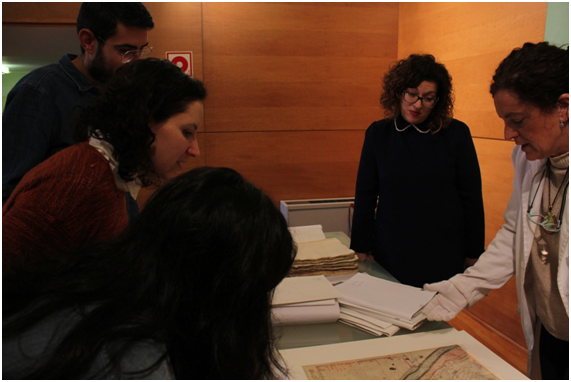
Ioana Gruia, has a Bachelor Degree in Hispanic Philology, in Literature Theory and Comparative Literature from the University of Granada, she has a PhD in Literary Theory and Comparative Literature from the University of Granada. Professor Gruia was invited to the course: Cases Studies I on February 21st and 22nd.
Visit to Mariana Pineda´s European Centre for Women
On February 20th, as part of the course Recursos Bibliográficos, coordinated by Ana Muñoz Muñoz, Director of the University´s Institute for Women and Gender Studies, 1st year GEMMA students visited the Mariana Pineda´s European Centre for Women.
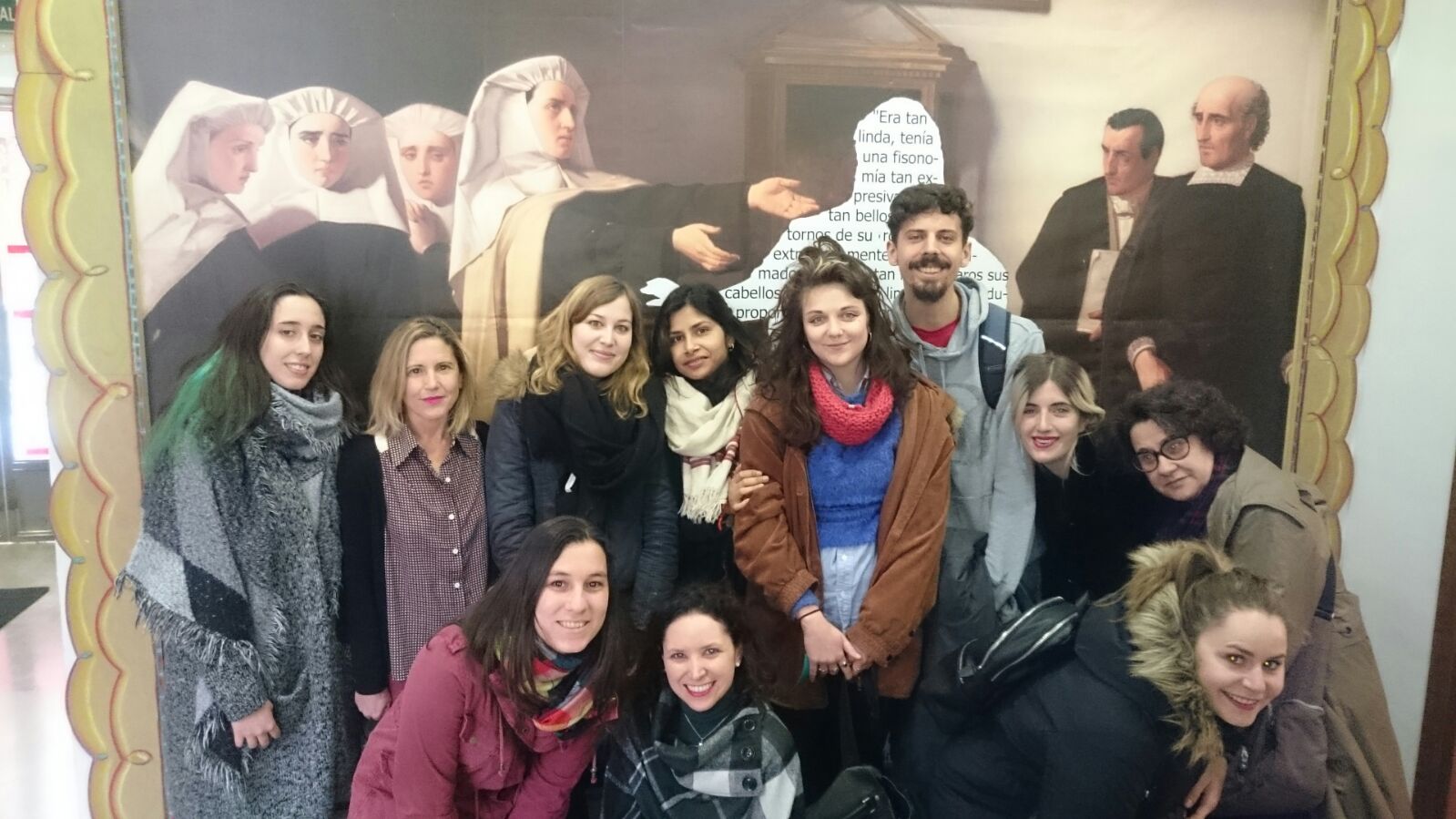
The Centre was founded upon Mariana Pineda´s last home. The exhibition shows different documents of her life, such as books, paintings and some of her belongings. During the visit, the students learned about Mariana Pineda´s life and how she became the symbol of the political fight in Granada. Throughout the year, the Centre provides workshops for women in Granada.
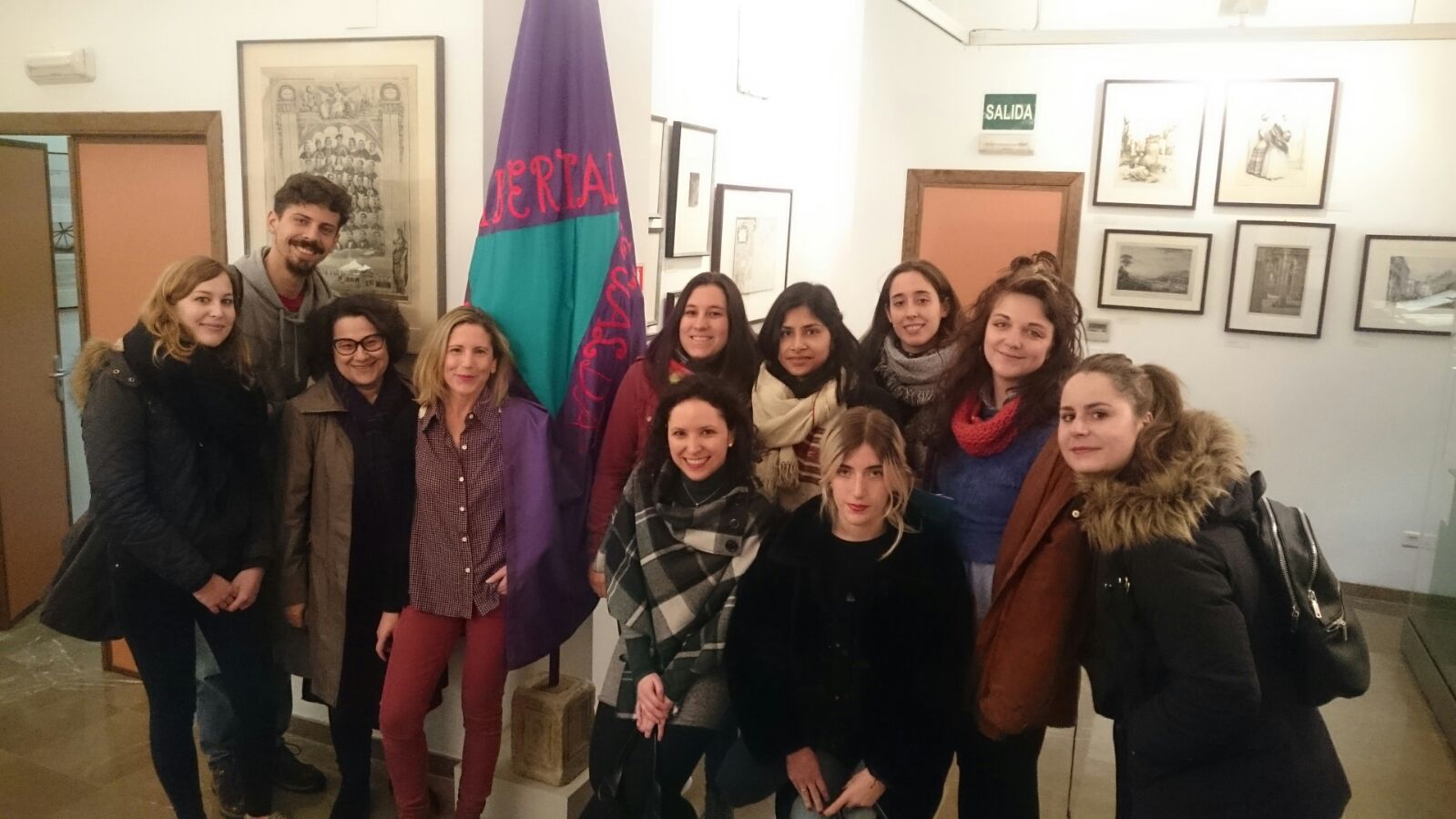
March 2017
Conference: Roots without borders: challenges and perspectives for migrant women (Raíces sin fronteras: Desafíos y perspectivas de mujeres migrantes)
On Tuesday, March 7th, as part of the activities of the International Women´s Day, the Conference: Roots without borders: challenges and perspectives for migrant women took place on the Assembly Hall of the Scientific Documentation Centre of the University of Granada. The event was coordinated by the Asociación Iberoamericamigrante with the support of the Institute of Women´s and Gender Studies of the University of Granada.
Dr. Ana Muñoz, the Director of the University´s Institute of Women´s and Gender Studies, was in charge of presenting the event to the audience and Zaira Zabala, member of the Colectivo Migrante organization, introduced the different members of the panel. The conference’s main objective was to make the reality of migrant women in Spain visible.
The first speaker was Carmen Gregorio Gil, Doctor in Anthropology and Professor of the Master GEMMA. She has studied the reality of women who migrate within a feminist perspective. The professor highlighted the importance of reporting unequal gender relations as part of the process to visualize the problematic. Feminism should be able to transcend borders. In addition, it must be transnational and built from the roots.
Carmen Caballos is a militant for women´s Human Rights since 1990. She is a founding member of Granada Acoge and the Federation Andalucía Acoge. She exposed on women carriers: injustice in their backs (Mujeres porteadoras: la injusticia a la espalda). Her presentation was about women carriers who cross the border between Morocco and Spain on daily basis. She played the video “Más de 6.000 personas cruzan Tarajal II” to portrait their reality. The border between these countries is one of the most unequal in the world. Almost 400 million euros are traded every year. Thousands of people go through the border every day to work, men mostly are employed in hostelry and construction, while women as domestic workers, sexual workers and carrying merchandise. They can only go through the limit for a day, the border opens from 7:30 in the morning until 1 pm and closes at 6 pm. The luggage they carry with them has no cost according to Moroccan law which is why they carry with them 50 to 90kg of merchandise. By selling it women make around 10 euros per day. This economy is fundamental in North of Africa, it benefits almost 400.000 people. Most carriers are women between 35 and 60 years old who need this work, despite of the adverse conditions and the extreme vulnerabilities they face. The route they travel in Ceuta is called the jail; they go through the death stairs, where they experience the hardest conditions. After, they walk a 1km path called the Biutz, the cage to wait long hours in the Polígono. Caballos discussed some of the conclusions stated in the Decalogue written by Cristina Fuentes, and presented by the Asociación Pro Derechos Humanos de Andalucía (APDHA). The report emphasizes on the violation of the human rights of women who cross the border and proposes a series of changes to be made by the Spanish Government urgently. They demanded the immediate closing of the Biutz, which closed on February 27th and the Tarajal II was habilitated. They also demanded the improvement of the conditions of the Polígono. The Spanish Government did not improve the basic conditions and the vulnerabilities of the women were even worsened. With that in mind, the previous situation had to be reinstated and the Biutz cage reopened. Among others, there is a demand to develop a protocol to standardize procedures, which will assure that women are treated humanely by the security body and to define a maximum weight permitted for women to carry. These requirements have not been met, so the situation has not changed yet.
Cristina Riera was born in Spain and moved to Venezuela with her parents where she lived most of her life. She worked as a Professor of international relations in the University of Caracas. She moved to Spain ten years ago due to family issues and political problems. Her professional experience has not been taken into consideration by the Spanish government nor private institutions, an issue she views as xenophobia. She is, currently, working as a caregiver and does domestic work. Cristina states that she suffers on a daily basis for not being able to be who she really is; she feels like she is wearing a costume. In addition, she emphasized the importance of fighting for an association of migrant women in Spain.
The next speaker was Mary Loli Martínez from Mexico. She presented Cultural Barriers for academic women (Barreras culturales para las mujeres académicas). Mary is an Astronomer doing her Post-Doctorate studies in Spain. In her experience as a young woman, a migrant from Latin-American, she has encountered several barriers and stereotypes. She had to fight against the Third World preconceptions that still exist in the Spanish and European academy.
Teresa Cruz, from El Salvador presented integration of Latin American women in Granada (integración de las mujeres Latinoamericanas en Granada). She moved to Granada on 2010 because her husband is from here. Even though she has a Graduate Degree in Education she never pursued a career here. Instead she volunteered in several non-profit organizations where she felt useful. Teresa reminded us the advantage of sharing the language towards the fight for horizontality and that searching for unity does not mean to erase all differences. She portraits integration as a dance; there are strict dances, but everybody moves according to its rhythm. We must integrate, be part of the culture but without losing our own identities and live by respecting differences. In the end, she highlighted the importance of women empowering ourselves, as migrants, with our own identities.
The last speaker was Jessica Rodríguez, who came from United States to study a Doctorate in Migration of the University of Granada. She lectured about the discriminatory parallelisms between United States and Europe (paralelismos discriminatorios entre EU y Eurpoa). In the United States, Latin women face violence every day, 1 in 4 live under the poverty line and suffer discriminations on every level of society. When starting University they face more difficulties than women from other ethnic backgrounds, only a 4% of Latin women in the United States have a Master Degree.
“Feminist shared conversations: talking with memories, a gender perspective on the past experience” 23rd March 2017
The Institute of Women's and Gender Studies arranged a symposium on the 23rd of March, named “Feminist shared conversations: talking with memories, a gender perspective on the past experience”. In the symposium, Nora Levinton and María Roson Villena were the key speakers, under Rosa Medina Doménech's moderating assistance.

María Rosón Villena, who has studied Art History, stressed how similar it is “to dismantle the discipline” and “to dismantle patriarchy”. The researcher talked about her experience, while writing her newest publication, Género, Memoria y cultura visual en el primer franquismo (“Gender, Memory and Visual Culture During the 1st Francoist Period”; Cátedra, 2016). Photographs can serve as significant historical records: not only due to their materiality with specific trajectories through human lives, but also because they often embody emotional attachments to the people involved in the pictures. For Rosón, History has undervalued photographs as relevant social and historical sources, and this is a gender bias: photographs are part of a daily materiality, strongly linked to women's spheres (the domestic space, the emotions...), “banal for historical hegemonic discourses”. In addition, since “memory changes the images”, Rosón has developed her project by re-watching photographic albums compiled under Franco's dictatorship along with the people involved: such as Esperanza, her aunt's neighbor.
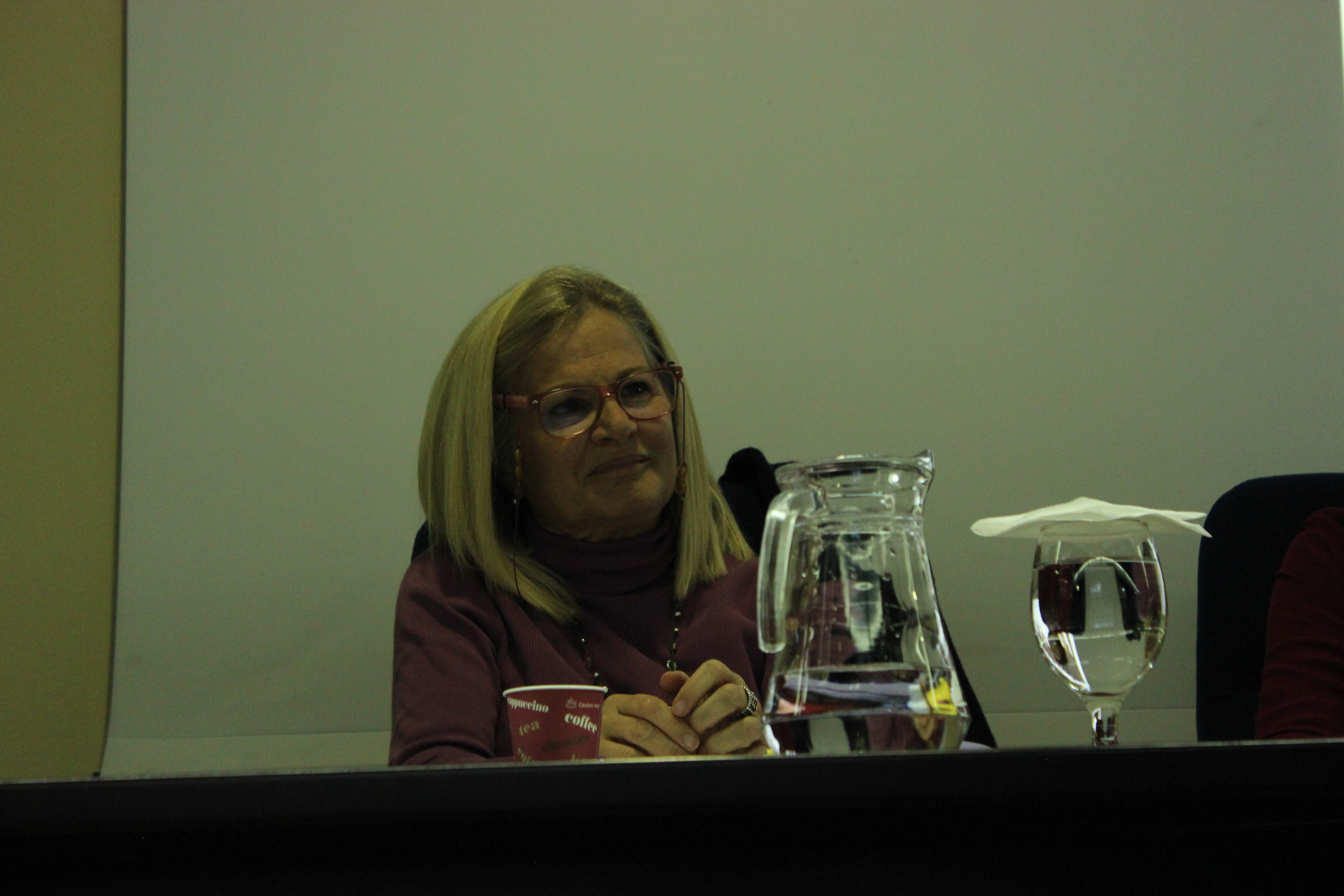
Nora Levinton is a feminist thinker who, as she herself claimed, has just abandoned the “psychoanalitical couch”. Levinton had to migrate to Spain in 1976 after the Argentinian army coup of Videla and others. She is the author, among other titles, of El superyo femenino: la moral en las mujeres (The Femenine Super-I: Morality in Women”; Biblioteca Nueva, 2000). For Levinton, “everything is memory” and this statement moves beyond her job as a psychoanalist, which somehow meant “working with the other's memories”: today's Levinton interests revolve around studying the links between individual and collective traumas through a feminist perspective. Talking with Rosón, Levinton wondered: how I tell who I am and through what defensive mechanisms? How do I tolerate telling who I am? Nonetheless, remembering processes are usually inter-subjective, and autobiographical versions are constantly shifting.
In the end, people from the public shared their gratitude, doubts and opinions with the speakers.
Invited Professor
On March 29th and 30th, María del Carmen Agulló was invited to the course Transformaciones socioeducativas en la España del siglo XX: feminismo y propuestas de igualdad, coordinated by professor Victoria Robles Sanjuan. Professor Agulló holds a PhD in Philosophy and Science Education from the University of Valencia (Spain), where she is currently tenured professor and teaches Theory and History of Education. In her GEMMA sessions, she discussed the following topics:
- The Conquest of Citizenship, the Modern Woman and Educational Advances in the Second Spanish Republic. She focused on the education of women in the 2nd Republic, during which some co-educative experiences were developed in primary education. The professor explained that through education the idea that women were to stay on the private sphere started to weaken. She also discussed the political and cultural conquests of the period.
- Women Role Models in the Spanish Civil War and Feminist Consciousness. The professor explained about the regression of women´s liberation achieved the previous period. They had to behave according to the models of women they learned through education: the one of the Sección Femenina de Falange and the Catholic model. Women learned how they were supposed to behave, the role models and the rules they had to follow.
May 2017
Seminar “Gloria Anzaldúa-the life, work and philosophy of writing” and the workshop “Where the Third World Grates Against the First and bleeds Gloria Anzaldúa and her Borderlines Theory”.
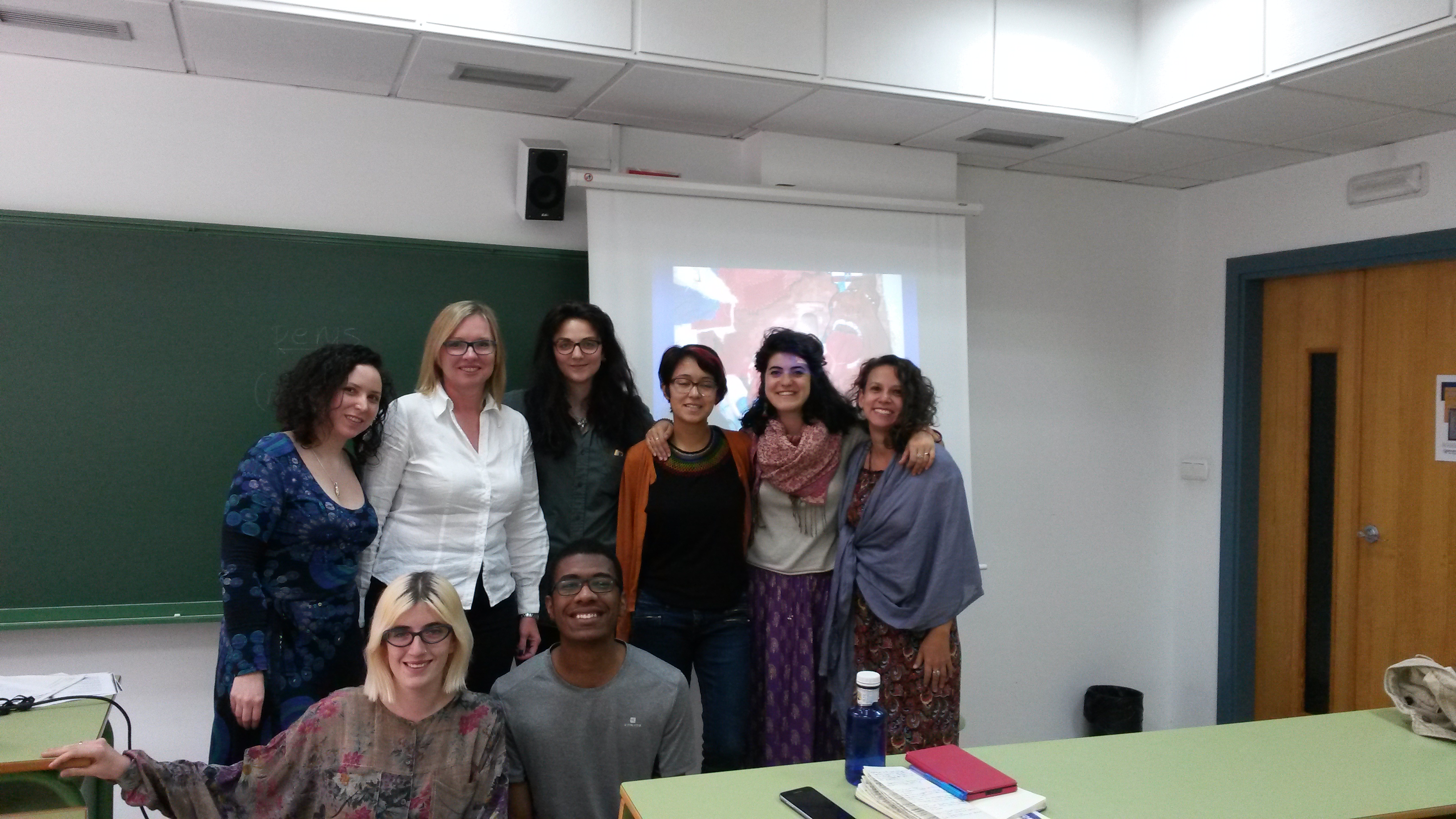
On May 11th, the GEMMA students had the visit of Dra Grazyna Zygadlo from Lodz University. Grazyna enlightened the students about the life and work of Gloria Anzaldúa. The day was divided in two activities, the Seminar “Gloria Anzaldúa-the life, work and philosophy of writing” and the workshop “Where the Third World Grates Against the First and bleeds Gloria Anzaldúa and her Borderlines Theory”. Gloria Anzaldúa is internationally recognized as a leading cultural theorist and a highly innovative author. She has won many awards, including the Before Columbus Foundation American Book Award, Lambda Literary Award for Lesbian Small Press, National Endowment for the Arts Fiction Award, Lesbian Rights Award, Sappho Award of Distinction, and American Studies Association Carl Bode-Norman Pearson Prize for a lifetime achievement. Anzaldúa’s childhood context had a great influence in her theory and writings. The geography and the culture of the region shaped her future life. She was born in Texas, USA in 1942 in a family of poor campesinos. Even though she was born as the 7th generation American in her family she was still seen as an outsider. The living conditions on Southern Texas are harsh and hostile so families are governed by nature. When she was eleven, her family moved to a small town, where they stayed until her father died four years later. Her family turned into a typical migrant family, wondering from state to state looking for seasonal jobs. Being a migrant worker played an important role on her life, it made her compassionate for poor people, who are living in unstable conditions and are humiliated by everybody. In school, she was one of the best students but nobody except her father believed she could make it to college. Gloria took special interest in books; they were important to her education because through them she discovered the world and could learn things that other people didn´t know. She was the first person in her family who left home to study at the University, after studying on and off for several years, due to financial problems, she received her Bachelor Degree in 1969 in English, Art and Secondary Education from the Pan American University. In 1972, she obtained her Master’s Degree from the University of Texas. The first years in the University were important for her because she saw women who had careers and lived their lives in the public sphere. During this time, she discovered that other women were lesbians like her and lived their lives openly, without the need to hide their real selves. When she died, from diabetes-related complications in 2004, she was only months away from finishing her PhD dissertation in Compared Literature. In 2005, the University of California at Santa Cruz posthumously awarded her the PhD Gloria Anzaldúa´s publications: • “This Bridge Called My Back”, published in 1981, co-edited by Cherrie Moraga focuses on the experiences of women of color, contrasting them with the white women feminism and their claims of solidarity between women. • In 1987, “Borderlands/La Frontera: The New Mestiza” was published. It is her most renowned book; it was highly recognized and awarded by different entities. The book is written both in English and Spanish, along with different variations and mixtures of both. It is divided into two parts. Part one, contains seven mixed-genre essays that combine autobiographical narrative with the history of the U.S.-Mexico border and Anzaldúa's innovative philosophy. Part two, contains thirty-eight poems divided into six sections. Throughout the book, Anzaldúa interweaves historical, contemporary, and mythic perspectives to describe her experiences as a Chicana-Tejana lesbian feminist while also developing her theories of “the new mestiza,” “mestiza consciousness,” and “the borderlands.” Her groundbreaking use of code-switching (transitions, sometimes within a single sentence or paragraph, between standard to working-class English and Chicano Spanish, Tex-Mex, Nahuatl-Aztec, etc.) impacted composition studies, literary studies, and Chicana/o studies. • In 1990, she published her second edited collection, “Making Face, Making Soul/Haciendo Caras: Creative and Critical Perspectives by Feminists of Color”. The collection illustrates GloriaAnzaldúa's desire to develop multicultural communities and new forms of politically engaged theorizing that combine social critique with aesthetic invention. • Anzaldúa published two bilingual children's books featuring Prietita, a strong female protagonist: “Friends from the Other Side/Amigos del otro lado” (1993) which explores friendship, undocumented workers, and the border patrol; “Prietita and the Ghost Woman/Prietita y la llorona” (1995) revises conventional views of “La Llorona” (“the Weeping Woman”), an important Mexican/Chicana cultural figure. • Anzaldúa also published a collection of interviews, “Interviews/Entrevistas” (2000), offering biographical information and insights into her theories and works in progress. • In 2002, Anzaldúa published “This bridge we call home: radical visions for transformation”, a multigenre co-edited collection of narratives, theoretical essays, short stories, poems, e-mail dialogues, and artwork that builds on and goes beyond “This Bridge Called My Back” to offer a transgressive vision of twenty-first-century women-of-color consciousness and documents the growth of Anzaldúa's vision of social change and her radically inclusionary feminism, or what she called “spiritual activism.” http://www.anb.org/articles/16/16-03593.html
Internship possibilities in the Concejalía de Igualdad
On May 17th, the GEMMA students participated in the presentation of internship possibilities, in the Concejalía de Igualdad of the Ayuntamiento de Granada. Lourdes Vilchez presented two different options for the students who wanted to work in the office. The first option offered to the students, was to work as interns in the Concejalía during the summer months in order to develop projects for next year, after the mobility semester. Those who are interested in working with the Concejalía during the summer, will have the opportunity to work hand in hand with professionals who develop projects of equality, as well as learn about how the work is done in the office. The second option, involves the students’ presentation of gender equality projects that they would like to implement in the different Municipios of Granada during 2018. The Concejalía will present the different projects to the Municipios and, if they are interested, the projects will be developed during the next year. The internship possibilities are a great opportunity for the students to start working in the sector of gender equality and to apply their acquired knowledge of the Master.
Presentation of the documentary “40 años de lucha feminista. Asamblea de Mujeres en Granada”
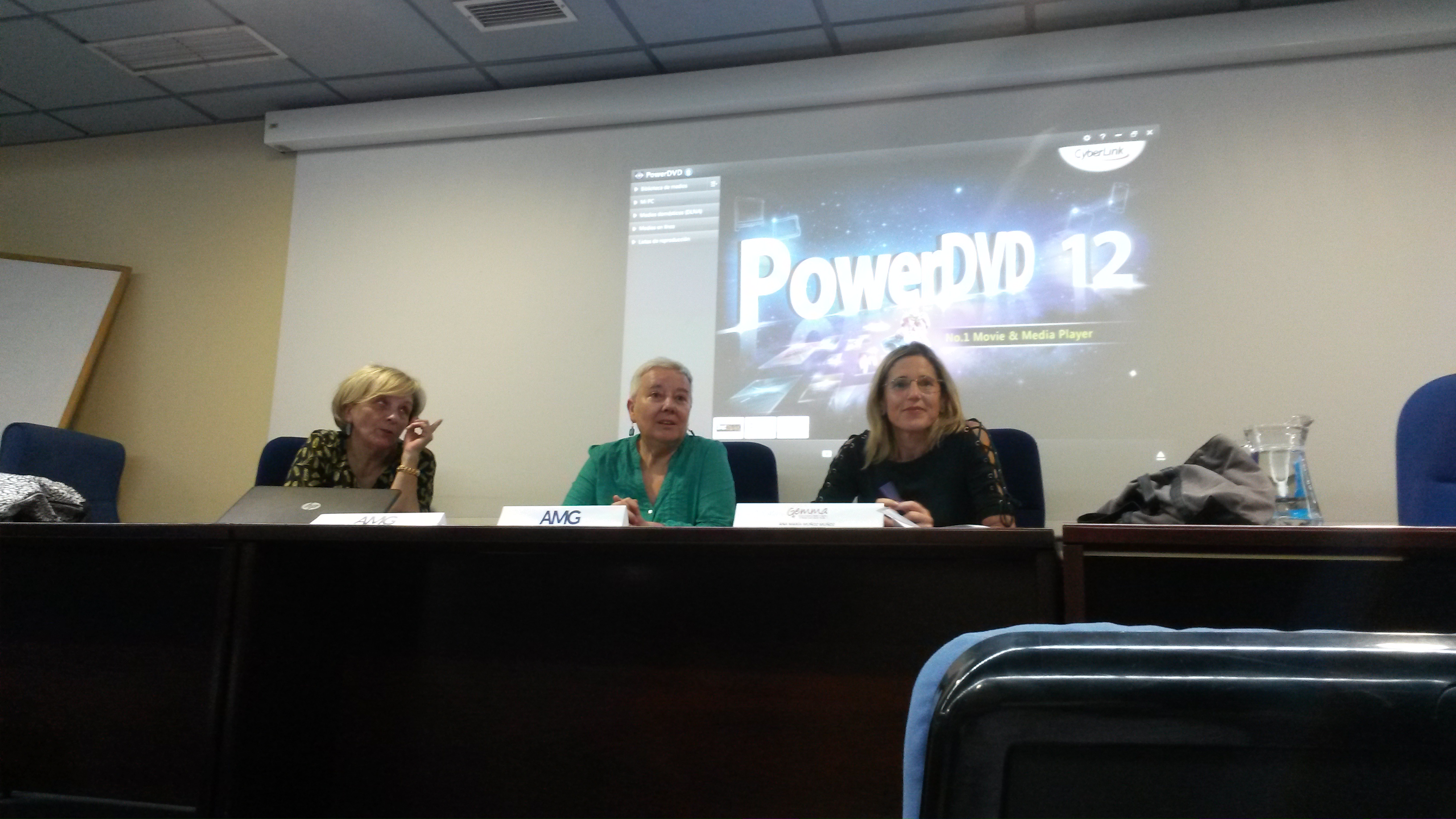
On May 23rd, in the Assembly Hall of the Scientific Centre of the University of Granada, the documentary “40 years of feminist fight. Asamblea de Mujeres en Granada” (“40 años de lucha feminista. Asamblea de Mujeresen Granada”) was shown. The activity was coordinated by the Asamblea de Mujeres de Granada with the collaboration of the University of Granada Institute of Women’s and Gender Studies. The documentary includes the interviews of 21 women, who are or were part of the Assembly, explaining the importance of feminism in their lives and the importance of the movement in Granada. They recall the milestone moments of the movement, such as the 1979’s women conference, in which more than 3,000 women were involved in the struggle towards equality and the 2009’s conference, in which 4.000 women participated. The film shows how the struggle for women´s rights through the social movement grew and became visible and renowned in Granada. The documentary is part of the collective local history that views the feminist movement in Granada as a historical movement.
Conference “The intellectual and her memory”
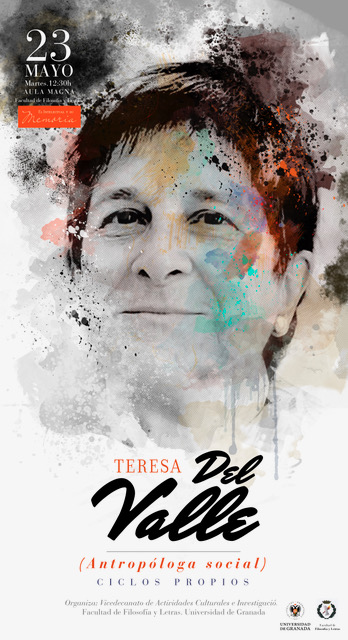
On May 23rd, as part of the cycle “The intellectual and her memory”, organized by the Faculty of Philosophy and Arts of the University of Granada, professors Cándida Martínez and Carmen Gregorio interviewed dr. Teresa del Valle.
During the interview, they explored her academic journey and her intellectual life. Teresa del Valle spoke about her professional experience, her research in the Basque Country, Micronesia, Hawaii, Mexico and North America.
She also referred to the importance of the development of the Feminist Anthropology as an academic discipline and the inclusion of women in the academic world, and the importance of the memory and the body in doing anthropological studies. In this process she identified as a millstone the first reunion of academic women in the University of Granada
The following is the link to watch the full conference.
June 2017
Movie screening: “Lipstick under my Burkha”
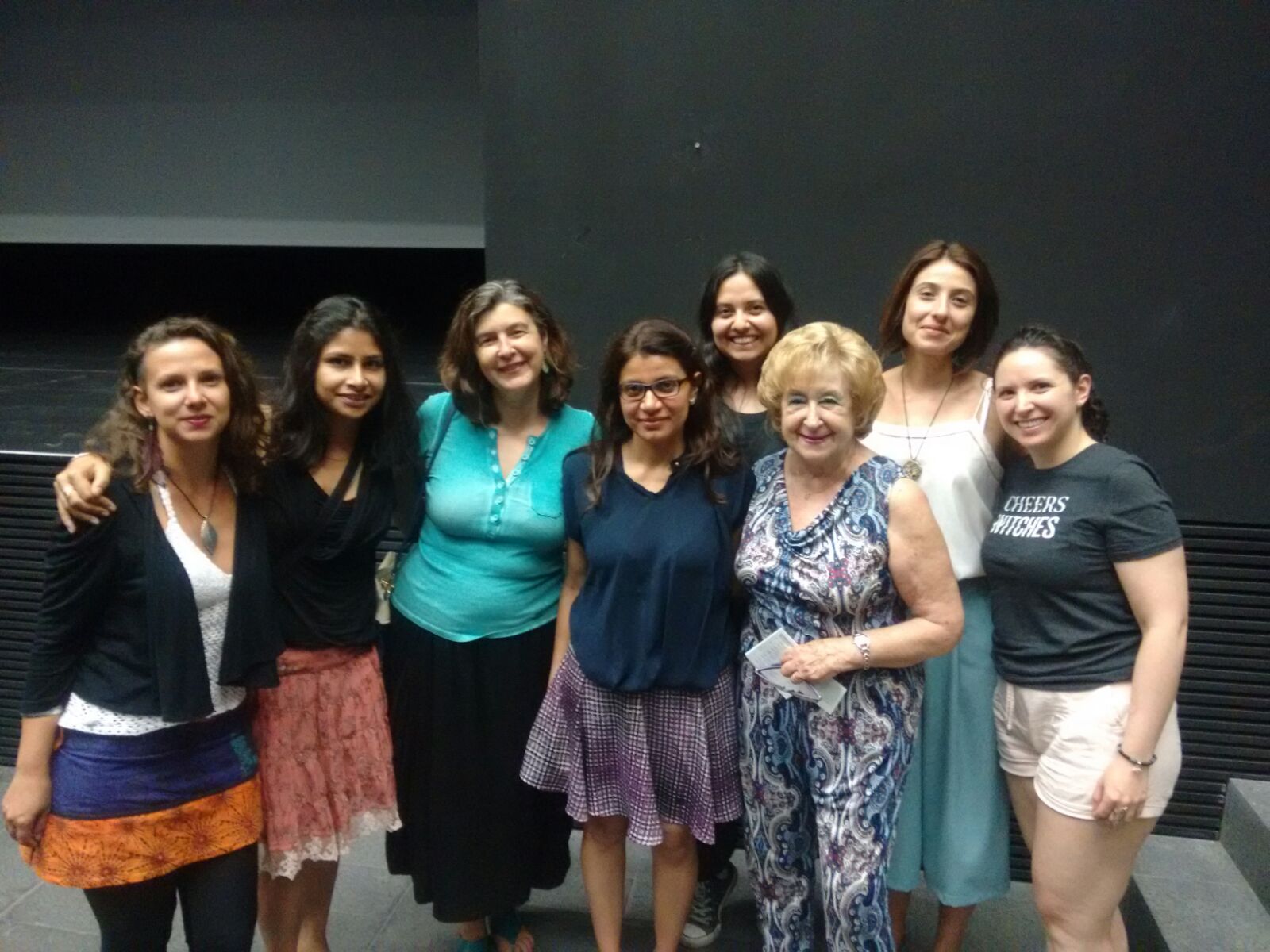
Within the framework of the 10th edition of the Cines del Sur Granada Film Festival organized by the Culture Council of the Junta de Andalucía from June 3 to 19, 2017, the film “Lipstick Under My Burkha” directed by Alankrita Shrivastava was presented.
The film presents the secret stories of four women from a small Indian village. In a realistic way, the director Alankrita Shrivastava shows without any hesitation the struggle of these women to gain their freedom in a world dominated by men and patriarchal traditions. Because of this, this film was banned in India for revealing a contrary image of the masculine mandates over the desires and behaviors expected from women in this country.
After the screening, an open-dialog was opened with director Alankrita Shrivastava. Students, teachers and part of the GEMMA team attended the projection and shared thoughts with the film´s director. In the following link the trailer is available.

